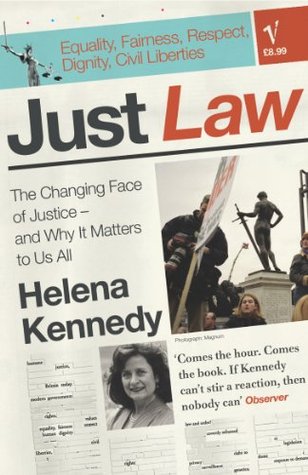Kindle Notes & Highlights
Read between
September 12 - September 12, 2019
The factors that improve systems are awareness, good training and changes in court behaviour,
While the system cannot dismiss public concerns out of hand, it is unconscionable for governments to pursue populist reform programmes which are based on a desire to appease important sections of the electorate at the expense of the most vulnerable.
The basic principles which should underlie any legal system are equality before the law, fairness and respect for human dignity.
Majorities can demand the death penalty, the majority resisted votes for women, the majority once thought slavery no bad thing.
The criminal justice system is based on the fundamental value that it is far worse to convict an innocent person than to let a guilty one walk free. It is that fundamental value which is now in jeopardy.
Supporting civil liberties is not to stand in the opposite corner to victims, but to caution against the creation of yet more victims.
A discourse on rights can also seem cold, abstract and legalistic because that is law’s purpose: to introduce reason and rationality into the passionate stuff of human existence.
Justice is not only a result; it is a process.
We want truth but we also want privacy, fairness, equality and finality.
means that sometimes the guilty will walk free because there is insufficient evidence on which to found a conviction or they will walk free in order to send a message to the state and the police that their methods are unacceptable.
erosion of the right to silence was then extended into the general criminal domestic law of the UK in the Criminal Justice and Public
‘amidst the clash of arms the law is not
The moral principles of ius in bello do not apply to violent subversive groups alone. The state too is duty bound to behave in morally consistent ways, whether or not the decision to defend itself is morally defensible.
Terrorism is not and never has been in itself a criminal offence. However, those who commit terrorist acts are committing acts which fall within the definitions of crime.
Would it be acceptable to remove the right to silence? Is it ever acceptable to deny access to the lawyer of one’s choice? Is it right to eavesdrop on what are normally privileged client–lawyer consultations? Is it fair to subject suspected terrorists to a higher risk of unjust conviction? Would a state be justified in lowering evidential standards by admitting hearsay, ignoring the need for corroboration, accepting confessions obtained in oppressive circumstances? The answer to all those questions must surely be no.
Good leadership involves having the courage to face down the uglier demands created by misinformation and wrong perceptions.
It is almost invariably because we have failed to live up to those principles. The answers to the problems are almost always to be found in better policing, lawyering and judging.
‘In a democracy, personal liberties are rarely diminished overnight. Rather they are lost gradually, by acts of well-meaning people, with good intentions, amid public approval. But the subtle loss of freedom is never recognised until the crisis is over and we look back in horror. And then it is too late.’
Citizenship can only ever be understood within the context of the history of the country in which it is exercised.
the jury, the conscience of the community speaks.
We are asking it to acknowledge what it may have forgotten or lost sight of: the deeper roots of justice.’
‘The direct and raw character of jury democracy makes it our most honest mirror.’
Civic capital is not easily reducible to pounds, shillings and pence, but it forms an unquantifiable yet hugely important base from which trust is created and from which thriving societies grow.
Individual rights have been the great historical counterweight to governmental authority and control; it falls to the judges to decide when rights are being infringed, which means that an independent judiciary is a crucial element in any democracy.
Fighting crime is no bad thing but when judges see themselves as allies of the police, impartiality goes overboard.
Periods of high political fever, whether over asylum or terrorism, require a strong judiciary and politicians with constitutional nous should see why this plank of democracy is so important. Weak but clever judges can be intellectually dishonest, making decisions which will please the powers that be and rock no boats.
John Smith’s
Alan Dershowitz
‘Candidates must also respect and have understanding of men, women and children of different backgrounds. They must be sensitive to the influence of different ethnic and cultural backgrounds on the attitudes and behaviour of people whom they encounter in the course of their work.’


